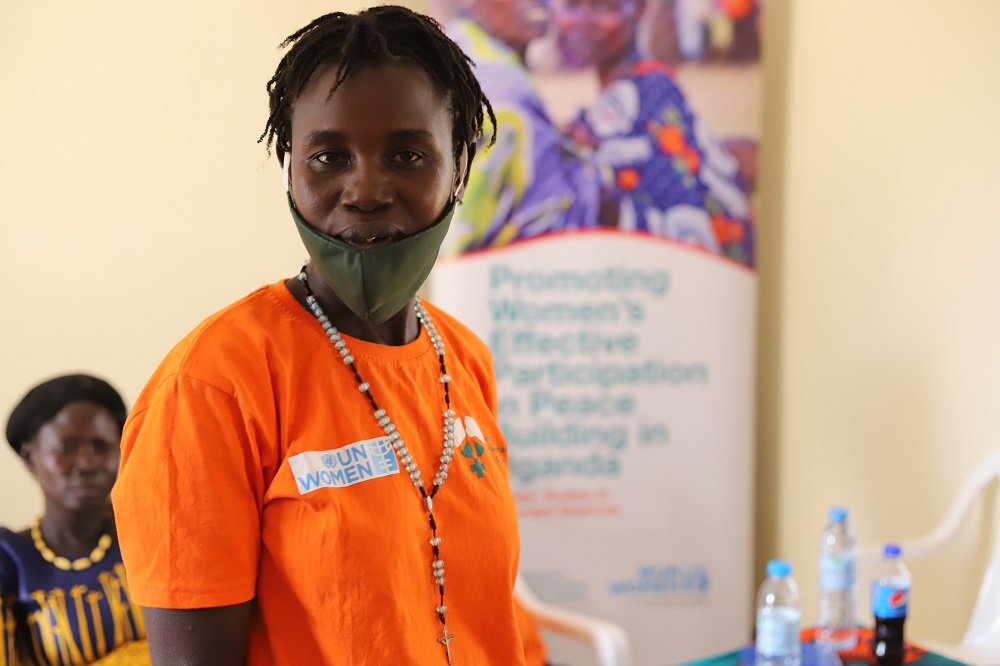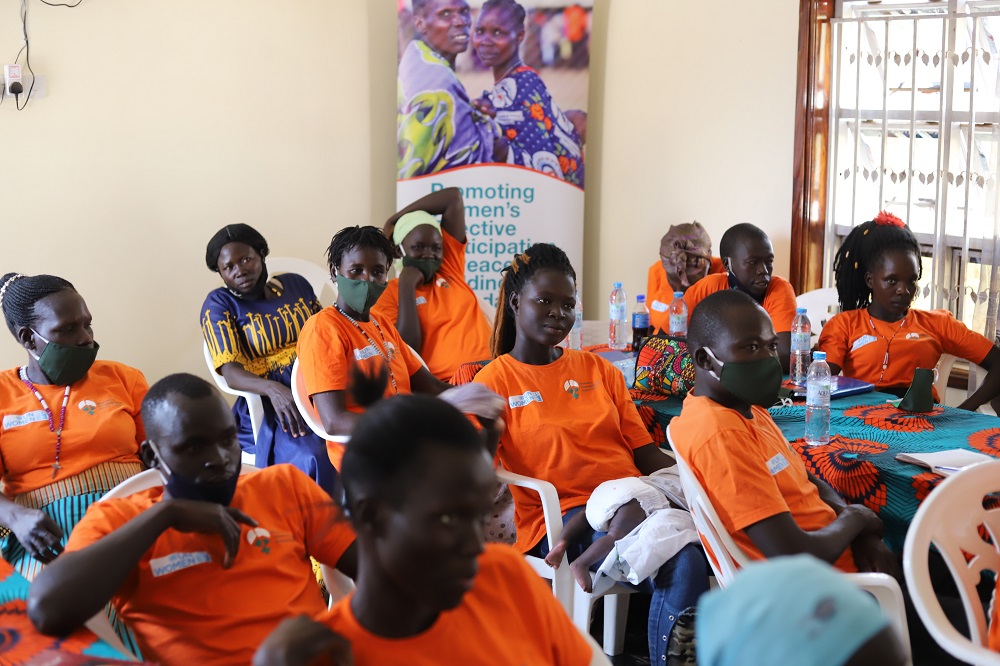To strengthen the leadership capacity and influence of local women leaders and women groups across refugee settlements and host communities The Peace Centre conducted a SASA Together! Start Phase Training of Trainers for 30 women leaders selected from Agojo Refugee Settlement and Ciforo sub-county in November 2020.
Prior to the Training of Trainers, we carried out a baseline assessment which identified that; community perceptions on balanced power relationships were negative with 54% of women and 46% of men blaming women for the violence they face. The common forms of violence against women reported by respondents included; physical violence (beatings) reported at 54%, sexual violence (defilement, rape) at 27%, economic violence (financial torture/denial) at 11% and emotional/psychosocial violence (abuses, insults) reported least at 8%. Violence against women was reportedly higher in Agojo refugee settlement with incidence rates at 51% and 48% in Ciforo Sub County.
Out of 71 SGBV cases reported, only 51 were handled conclusively implying a gap in responding to SGBV issues. Formal spaces/platforms for women leaders to engage in dialogue with duty-bearers for accountability are non-existent since Agojo does not even have a women’s safe space. Although Community based services departments sometimes hold community engagements, more action needs to be taken to address Violence Against Women (VAW) in the refugee and host communities. It was imperative that we enhanced the capacities of the leaders to address VAW in their communities. Since the November training, the Community Activists have played a key role in mobilising community dialogues and addressing issues in their community.
On 10th February, The Peace Centre under the project “Leading Voices: Strengthening Capacities for Gender-Based Violence Prevention and Peace Building in Humanitarian Contexts in Adjumani district” supported by UN Women under Women Peace and Humanitarian Fund held a monitoring and mentorship session for Community Activists to identify and assess what has changed at personal, family and community level and the conflict issues that still need to be addressed. These Community Activists continue to play a pivotal role in the reduction of gender-based violence.

I gave UGX.60,000 to my wife to keep it. I had planned to save it in the Village Saving and Loans Association (VSLA) but when I wanted to take it to the VSLA group she could not give it back to me. I got so annoyed and wanted to beat her up but I remembered the values I carry as a Community Activist. The knowledge I got from the training saved my own relationship. I did not do anything to her and I have never asked for the money again. If it had happened before I got empowered, I would have beaten her up. I also managed to talk to 6 of my neighbours who had problems in their marriages, I used my example to influence the men’s attitude and they have not fought since then. Iranya Charles, Mocope, Ciforo Sub County
The training helped me improve communication in my marriage. I was the final person in every decision that had to be made. The training helped me realise the importance of involving my family in every decision. In the past, I made wrong decisions because I did not consult my family. I also helped four of my friends who were drunkards, they never spent time with their families because they would stay in the drinking joints all day. Their drinking is reducing day by day. I also intervened in a case of a 16-year-old boy who wanted to marry a 30-year-old woman. At first, the boy was annoyed with me because I stopped the marriage. Later on, he came back and appreciated me for saving him from the marriage. Idro Micheal Inyani, Agojo Refugee Settlement

I changed my approach to my drunkard husband. I hated him because he drank a lot and he did not care for us. Whenever I’d ask for money from him, his response was always the same “There’s no money” and yet he is drinking 24/7. I told him about what I learned from the SASA training. We used to fight a lot but now I engage him and I tell him what I feel. Our communication has improved. I used to walk back home so that I could save part of the transport refund I got during the training which paid off because I bought a goat. At least I know that it will help my children and will not always have to rely on my husband. I also handled a case involving two neighbours who were always conflicting with each other. One decided to carry her things and leave the only land that was allocated to her by the Office of the Prime Minister. She was stranded. I informed the community leaders who came in and we talked to her and encouraged her to go back to her home. But still, she was not reaching the neighbours’ home yet we were doing village savings there. I continued to engage both of them and the relationship has improved. As the Secretary for Children’s Affairs in my community, I mobilised and talked to 35 girls about early marriage. I asked them to draw their vision showing what they want to be in the future and hang it on their walls such that they are reminded to strive to achieve their vision each day that passes by and they don’t end in early, forced and abusive relationships. Mesiko Night, Agojo Refugee Settlement
I was such an unforgiving person. I would fight over every little issue. I looked at myself as tough and a no-nonsense woman. As a result of the training, I am now more forgiving. I no longer carry a lot of burden in my heart which has improved my life greatly. Drate Florence, Agojo Refugee Settlement

I was called an Economic Woman. I would not give my money to anyone nor did I contribute my hard-earned money to my family for the last seven years in my marriage. I was secretive with my husband and he had never seen my money. After the training, I thought I should give it a try. I bought a pregnant goat using my hard-earned money and the goat produced twins. My husband is very happy because for the first time he saw my money’s value and for that, he has promised to pay my bride price to my parents. I thank The Peace Centre for empowering me and opening my eyes. My life has changed and I am now enjoying my marriage because we are able to put our resources together and achieve better. Gule Rose Juma, Loa, Ciforo Sub County

I am well known to be a very stubborn woman in my community. On 1st January 2020, I followed my husband to the trading centre. He asked me to go back home and I told him I would not go unless we went back together. We quarrelled a lot and he went away on 6th January to South Sudan. I stopped picking his calls. He came back in December. Knocked at my door and I refused to open for him three consecutive nights. He engaged the neighbours who talked to me but I was not ready to welcome him back. When I reflected on the information I got at the training, I was able to forgive him. We started living well. He constructed for me a house and a kitchen. Since he went back to South Sudan, our communication has improved. He sends us some money for upkeep. I realised that I was also bridging violence in my relationship. Angua Night, Agojo Refugee Settlement

“I had two neighbours who were always conflicting. One day, one of them went to the other’s home and destroyed very many things from her neighbours’ home claiming she could no longer tolerate the abuse. I engaged her and realised that it was transferred aggression because her husband had abandoned her with two children. I advised her to leave the children with the mother & go back to school. Which she has done. I was able to realise the power within, saved some little money, bought grass and thatched my house. I was almost sleeping in a roofless house.” Angua Rose Daniel, Agojo Refugee Settlement
“Before I started working with The Peace Centre, I used to believe that I was stronger than my husband. I would quarrel all night. Sorry was not part of my vocabulary, asking politely was not an option. I would not take his advice on anything. I used to be very arrogant. The Peace Centre has mentored me. I realised that I was bullying my husband. I have changed my attitude and things have changed for the better.” Dranjowa Christine, Field Officer, The Peace Centre

“I used to be very tough. The boy I worked with likes stealing and I would beat him seriously. If I had authority, I would have chased him away but he is a relative to my employer. The training changed my mind about him. Instead of beating and chasing him away, I realised that I needed to help him out of the problem before it worsens. After the training, I went back, bought snacks and drinks I enjoyed with him, showed him love and then I talked to him about his behaviour. He promised to stop. Since then, he has not stolen anything. I can now leave money in the open and he never picks it.” Anyovi Saviour Justine, Loa, Ciforo Sub County

“I had a character that would ignore my husband whenever he would annoy me, even when he is sick, I would not attend to him. I would carry anger for so long. I thank the Peace Centre for the program that directly touches our lives, the program has not only taught us about GBV but also love, respect, trust and family development. I went back and informed my husband about what we were trained in. I wish that our husbands are involved in the next meetings for them to change just as we have changed.” Yaiya Sarah Lodo, Marila village, Ciforo Sub County
“I sat Senior Six and scored 9 points. I am waiting for any opportunity to get back to school. The training helped me to handle my own issues. I went to see a friend and when I returned home; I was asked to go back to where I was coming from. So, I ended up in the marriage. After six months my relatives came to ask for dowry but the boy is an orphan who has nothing completely, my family wanted to take me back home because my husband was unable to produce the dowry. I stood my ground and told them; “I won’t go back home.” I asked my husband to commit in writing that he will first send me back to school before we can have children. Because of the training, I was able to handle my own problems as well. I would not know what to do but I ably gathered myself and made a decision. Lilly Kiden Michael, Agojo Refugee Settlement
Preventing violence against women is critical work that requires commitment, focus and community. Diverse women and men in the community continue to engage and encourage their family, friends, neighbours and others to reflect on, discuss and act to prevent violence against women. Together, we can strengthen our work to ensure that women are free to live with dignity, safety and an unwavering belief in themselves within healthy and safe relationships and communities.


